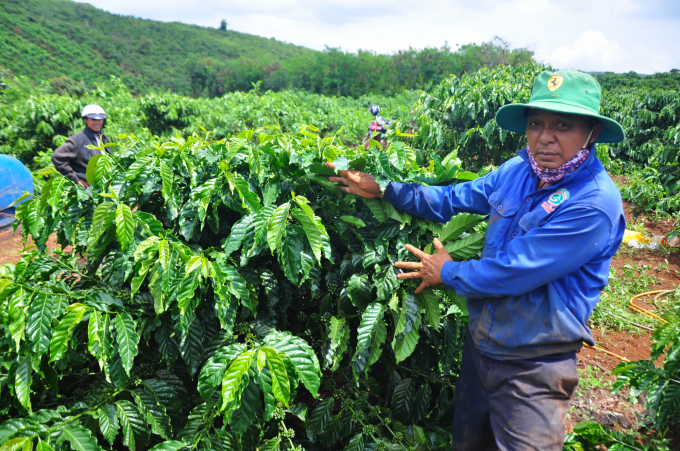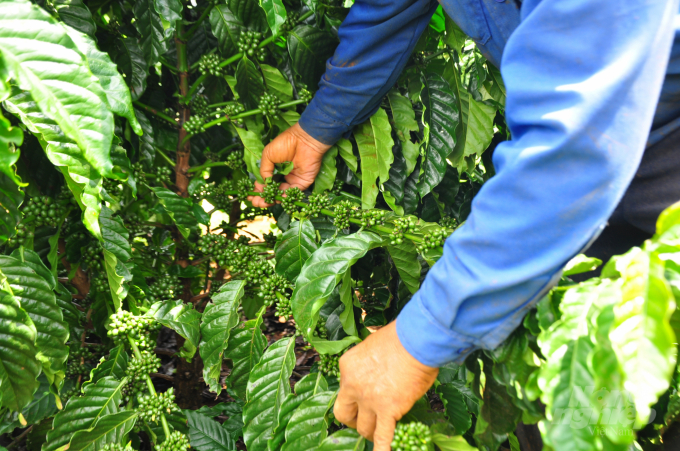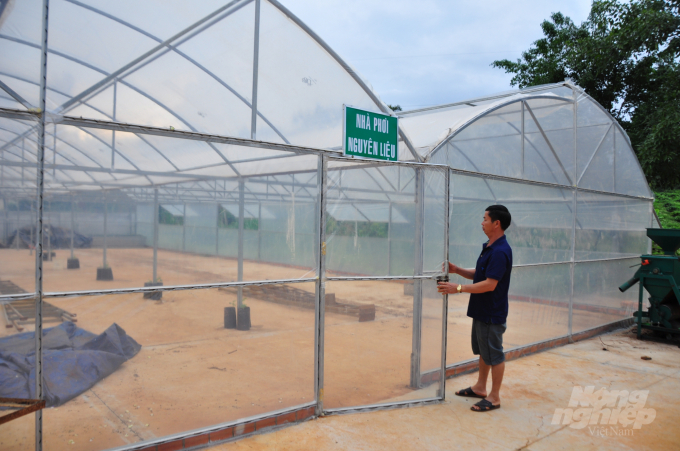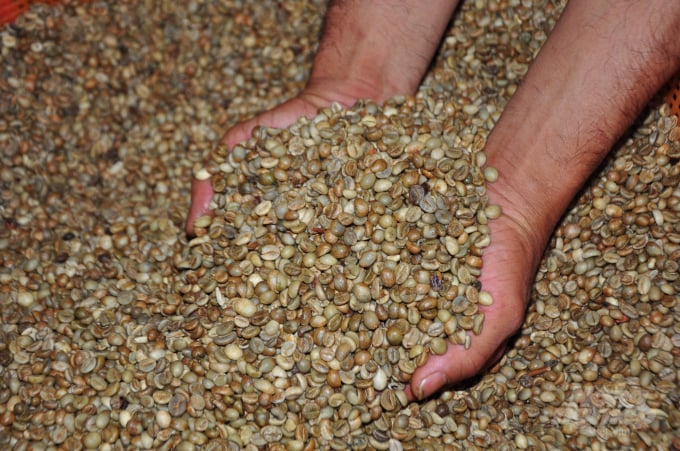November 19, 2025 | 17:09 GMT +7
November 19, 2025 | 17:09 GMT +7
Hotline: 0913.378.918
November 19, 2025 | 17:09 GMT +7
Hotline: 0913.378.918

The VnSAT project has brought positive effects, helping farmers to stabilize production and promote sustainable coffee industry development. Photo: M.H.
In Lam Dong province, the Vietnam - Sustainable Agriculture Transformation Project ('VnSAT Project') project is implemented in 8 districts and cities, with a total coffee area of over 16,000 hectares and 15,000 participating farmers. Over the years, the project has brought positive effects, helping farmers to stabilize production and promote sustainable coffee industry development.
Mr. Nguyen Minh Ngoc, Director of Tan Nghia Cooperative (Tan Nghia Commune, Di Linh District, Lam Dong Province) said that over the past time, the VnSAT project has supported farmers to transform science and technology, build building models, improving seedlings.
In particular, the project has supported farmers to borrow loans with preferential interest rates. "Currently, the cooperative has 26 members who are entitled to this preferential loan. The loan time is longer than other loan contracts, the interest is lower, the conditions are good for farmers to develop the household economy", said Mr. Nguyen Minh Ngoc.
Along with supporting farmers to access capital for investment and production, over the past time, VnSAT Lam Dong has also invested in infrastructure and rural roads. Up to now, the total investment capital in rural roads for production in Tan Nghia commune is about US$ 16 billion.
Besides, the VnSAT project also has a long-term orientation on developing coffee trees for farmers. Especially building coffee models that meet VietGAP standards to increase output and product value, helping her escape poverty.

In Dak Nong province, the VnSAT project has had a great impact in developing the value chain of the coffee industry. Photo: M.H.
According to Mr. Nguyen Van Chau, Deputy Director of the Department of Agriculture and Rural Development of Lam Dong province said that thanks to access to preferential loans from banks, farmers in the project area have improved the efficiency of coffee replanting, limiting the small replanting.
Through the VnSAT project, the quality of replanted coffee gardens has been improved. Also, the uniformity of the orchards has been improved, helping people to actively apply the right scientific and technical measures, bringing practical benefits throughout the business cycle.
According to the VnSAT Lam Dong's Project Management Board, over the past time, the VnSAT project has had a great impact in developing the value chain of the coffee industry. The project called for the establishment of cooperatives and supported farmer organizations with infrastructures such as warehouses, drying yards, roads, and equipment and machinery for coffee production and processing for increasing product value.
In Dak Nong province, in the period from 2015 to 2020, the VnSAT project is implemented in 6 districts/cities with a coffee area of about 107 thousand hectares. During this time, the project's supporting activities have helped people to have investment conditions and stabilize production.

In the period from 2015 to 2020, the VnSAT project is implemented in 6 districts/cities with a coffee area of about 107 thousand hectares in Dak Nong province. Photo: M.H.
From 2016 up to now, commercial banks in Lam Dong province have disbursed 1.3 thousand loans with the amount of VND 614 billion to support farmers in 3,000-hectare coffee replanting.
Having preferential capital during this time has helped farmers to actively replant with high-quality seeds, invest in an economical irrigation system and other items to move towards sustainable production.
Mr. Pham Hung Vy, Deputy Director of the VnSAT Project's Management Board in Dak Nong province, said that the project's support items have helped people stabilize production, helping farmers' organizations focus on creating coffee industry value chains.
Dak Lak province is considered to have many natural advantages for developing coffee trees. However, this advantage is not the same between districts, which leads to a large difference in the scale of coffee production in the regions.
After 6 years of implementation, the VnSAT project has supported farmer organizations to produce coffee sustainably. The project also supports many farmer organizations to invest in infrastructures such as warehouses, drying yards, coffee processing machinery, and equipment to help to improve productivity and quality, meeting standards for export.

Sự hỗ trợ từ dự án VnSAT đã góp phần thúc đẩy ngành hàng cà phê ở các tỉnh Tây Nguyên. Ảnh: M.H.
Mr. Phan Trong Ky, Director of Chu Kpo Agricultural Service Cooperative, said that the unit was supported by the VnSAT project with more than VND 6 billion to build factories, train science and technology and help people replant coffee. When participating in the project, cooperative members are organically directed towards sustainable agricultural production. The project has helped the unit form a high-quality coffee industry, thereby increasing income for its members.
According to Mr. Ky, when participating in the VnSAT project, the cooperative was supported in finding domestic and export markets. Currently, the cooperative is directing people to change their farming mindset and prioritize product quality. Specifically, cooperative members reduce inorganic fertilizers and replant quality coffee varieties.
Mr. Nguyen Hoai Duong, Director of the Department of Agriculture and Rural Development of Dak Lak province, assessed that the VnSAT project has contributed greatly to the province's coffee industry. If in the 2006-2010 period, the province's average GDP growth rater reached 11-12% per year. Then in the 2016-2020 period, it has increased to 12.5-13.5% per year; and the size of the economy in 2020 has increased 1.5-1.6 times higher than in 2015.
From 2015 to now, the VnSAT Project in Dak Nong has built 110 (equivalent to 110 hectares) sustainable coffee production sites to serve the purpose of learning and replicating this type of coffee area. The demonstration production model is highly effective, so it creates a ripple effect. Up to now, households outside the project area have also learned and implemented production to improve productivity, quality, and farmers' income.
Translated by Ha Phuc

(VAN) Agricultural extension officers in Quang Ninh do more than transmit knowledge; they have become a steadfast support system for farmers on the path to sustainable agricultural development.

(VAN) The development of a high-quality beef cattle herd has brought major benefits to livestock farmers, creating jobs and enabling better use of agricultural by-products.

(VAN) In the eastern region of Gia Lai, crossbred cattle now account for 93%, forming a high-quality beef herd and establishing a recognized brand, the result of 35 years of persistent effort.

(VAN) Integrating agricultural extension activities with ecotourism development unlocks promising new avenues for localities boasting specific advantages in grape and apple cultivation.

(VAN) Enterprises and cooperatives accompany farmers in Tay Ninh to develop an organic seedless lime growing area, paving the way for poverty reduction.

(VAN) There were times when Pho faltered, yet his aspiration to bring the pure aroma to those who truly value clean tea kept urging him forward.

(VAN) Bich Thao Coffee Cooperative pioneered products achieving the national 5-star OCOP standard, paving the way for Son La coffee to conquer international markets.